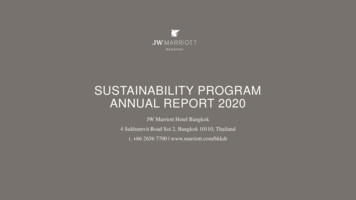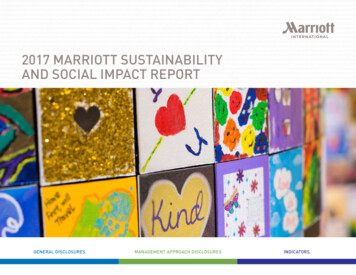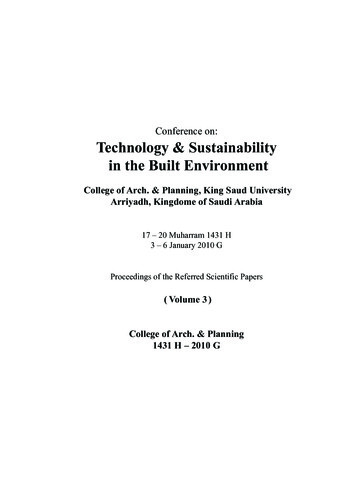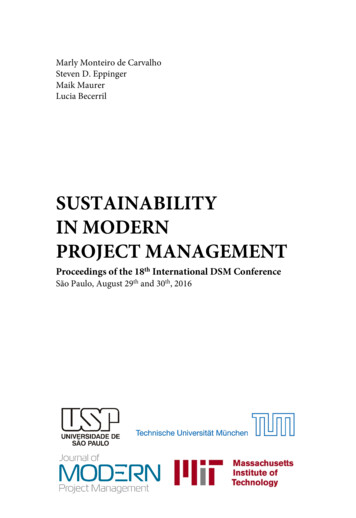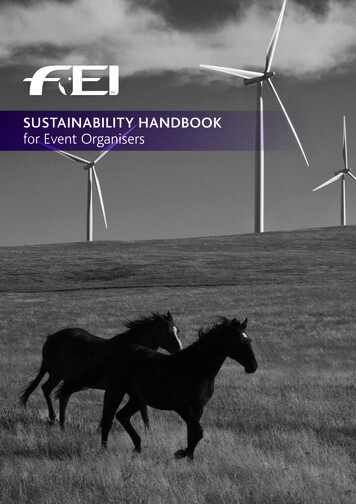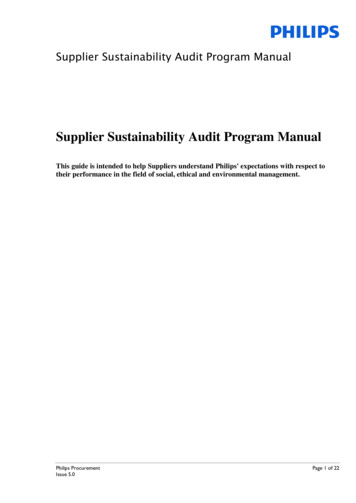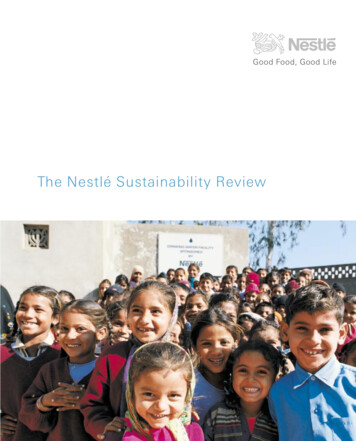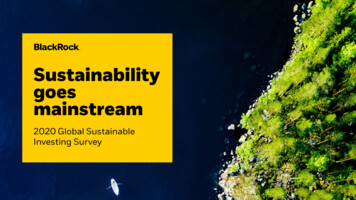
Transcription
Sustainabilitygoesmainstream2020 Global SustainableInvesting SurveySCROLL
A tectonicshiftacceleratesRespondents to BlackRock’s firstsustainable investing survey revealthat sustainability considerationsare increasingly becoming a centralaspect of their investment approaches.About thesurveyWhat respondentsare saying010203Sustainability ishere to stayA shift in capitalallocationThe datachallenge040506Climate is kingA whole portfolioapproachFixed incomeand alternativesset to growBSIH1220U/M-1432477-02/382
About the surveyAt the beginning of 2020, BlackRock laid a series of steps to make sustainabilitya key component of our investment approach. Our actions were driven by aninvestment conviction that an understanding of sustainability issues is essentialto long-term investment performance. That conviction – also held by asset ownersrepresenting trillions of dollars globally – is driving a tectonic shift in capital towardssustainable assets.In order to deepen our understanding of this shift – and how the pandemic wouldaffect it – we recently surveyed our clients around the world. We also sought tounderstand the main challenges sustainable investing faces and areas whereinnovation can spur adoption. Respondents included corporate and public pensionplans, sovereign wealth funds, insurers, asset managers, endowments, foundations,and global wealth managers. In total, we heard from 425 investors in 27 countriesrepresenting an estimated USD25 trillion in assets under management.Respondents areplanning to doubletheir sustainableassets undermanagementin the next five years.Our findings were clear: investors recognize the importance of sustainableinvesting to risk-adjusted returns and are backing up this conviction withtheir asset allocation plans, though scale of adoption does vary by region.BSIH1220U/M-1432477-03/383
Challenges to adoption remain, particularly around the quality and availabilityof data. But the tectonic shift continues apace, as investors seek to increasetheir exposure to sustainable assets, with respondents planning to doubletheir sustainable assets under management in the next five years.All results included in this report are from BlackRock’s Global Client SustainableInvesting Survey, unless otherwise noted. The survey is not intended tobe representative of the global populations of Institutional and WealthManagement audiences. Global statistics have accordingly not been weightedto the audience in its entirety. Any opinions expressed reflect our survey andinterview results as at the end of September 2020. They are not intended tobe a forecast of future events or a guarantee of future results. There is noguarantee that any forecasts made will come to pass. All values are representedin USD. The survey was conducted through a combination of an online surveyand telephone interviews, conducted by our research partner Illuminas.Notes: Europe, Middle East, and Africa (EMEA) region includes respondents fromAustria, Belgium, Czech Republic, Denmark, France, Germany, Italy, Luxembourg,Netherlands, Portugal, Spain, Sweden, South Africa, Switzerland, and UnitedKingdom. Asia-Pacific (APAC) region includes respondents from Australia, HongKong, Indonesia, Japan, Philippines, Singapore, South Korea and Thailand.Americas (AMRS) region includes respondents from Brazil, Canada, Colombia,and United States. Government Pension segment includes responses from bothgovernment pension plans and official institutions, such as central banks andsovereign wealth funds.BSIH1220U/M-1432477-04/384
Distribution of respondents by regionEurope, Middle Eastand Africa (EMEA)62%Asia-Pacific(APAC)North andSouth America (AMRS)12%25 %Base size: Total (425); unweighted. Sample size is 425 throughout unless denoted otherwise. Percentages shouldsum to 100 /- 2% due to rounding. BlackRock Global Client Sustainable Investing Survey. July – September 2020.BSIH1220U/M-1432477-05/385
Distribution of respondentsby types of participating orporate pensionGovernment/public pensionAsset managerInsuranceEndowment, foundation, or charityOther institutionalPrivate bankOther wealthBase size: Total (425); Percentages should sum to 100 /- 2% due to rounding.BlackRock Global Client Sustainable Investing Survey. July – September 2020.BSIH1220U/M-1432477-06/386
What respondentsare saying01Sustainability is here to stayOver half of global respondents – 54% – consider sustainable investingto be fundamental to investment processes and outcomes.Regional differences are key in how investors evaluate sustainability –while it’s become the new normal in EMEA, respondents in APAC andAmericas appear to be in the early stages of their sustainability journeys.86% of EMEA respondents have stated that sustainable investingis already – or will become – central to their investment strategies.57% of respondents in APAC and 47% of respondents in theAmericas share this view.BSIH1220U/M-1432477-07/387
02A shift in capital allocationRespondents plan to double their sustainable assets undermanagement in the next five years – rising from 18% of assetsunder management on average today to 37% on average by 2025.Though the rise is most pronounced in EMEA, where respondentsexpect sustainable AUM is to make up 47% of total assets withinfive years, respondents in both the Americas and APAC expectsizable increases as well.The global pandemic does not appear to have hampered thischange, with only 3% of respondents expecting to delay theirimplementation of sustainable investing as a result.03The data challenge53% of global respondents cited the poor quality or availability ofEnvironmental, Social, and Governance (ESG) data and analytics asthe biggest barrier to deeper or broader implementation of sustainableinvesting, higher than any other barrier that we tested. This wasconsistent across all regions.BSIH1220U/M-1432477-08/388
0405Climate is kingWhen comparing focus on ESG factors, 88% of global respondentsranked Environment as the priority most in focus amongst those choicestoday, reflecting the urgency that is presented by climate change.Furthermore, the Sustainable Development Goals (SDGs) and ParisAccord both offer goal-oriented frameworks to which investors arealready aiming. While adoption of these frameworks is currently low,respondents expect adoption to increase.A whole portfolio approachESG integration seems to be the most popular approach to sustainableinvesting, with 75% of global respondents currently, or considering,integrating ESG into their investment decisions, followed by 65% ofrespondents who utilize, or who would consider utilizing, exclusionaryscreens as a key mechanism for expressing their sustainability principles.BSIH1220U/M-1432477-09/389
06Fixed income and alternativesset to growWhile equity allocations are, and will likely continue to remain acore part of respondents’ sustainable asset allocation frameworks,respondents expressed interest in increasing their exposure tosustainable fixed income and alternatives asset classes.Responses show that indexing is set to play a more significant rolein the future, particularly within EMEA, with growing focus on fixedincome indexing.BSIH1220U/M-1432477-10/3810
ABOUT THE SURVEYWHAT RESPONDENTS ARE SAYINGSUSTAINABILITY IS HERE TO STAY 01A SHIFT IN CAPITAL ALLOCATION 02THE DATA CHALLENGE 03CLIMATE IS KING 04A WHOLE PORTFOLIO APPROACH 05FIXED INCOME AND ALTERNATIVES SET TO GROW 0601Sustainabilityis here to stay
The importanceof sustainability01 How important is sustainable investing, or sustainability,in your investment processes and outcomes? (%)Global %182854EMEA62964APAC284032AMRS40 Not important Fairly important 20Overall, the majority of respondents globallyconsider sustainable investing to be importantto investment processes and outcomes. It is clear,however, that the degree of importance attachedvaries considerably across the globe.In the Americas, 40% of respondents viewsustainability as very important, with a similarproportion believing it unimportant.In EMEA, in contrast, the majority considersustainable investing to be critically importantstrategically, with 64% indicating it as their#1 priority or very important, and 94% believeit to be important overall.40Very importantPercentages should sum to 100 /- 2% due to rounding.BlackRock Global Client Sustainable Investing Survey. July – September 2020.BSIH1220U/M-1432477-12/3812
An increasinglyimportant rolein EMEA02 Which of the following describes your views of the long-termdirection of sustainable investing? (%)Global %73235EMEA8612 2APAC57368AMRS47 Central to our strategy Valid but niche exposure42 11This sentiment is echoed in respondents’ longterm views of sustainable investing. Globally, only5% of respondents believe sustainable investingto be a short-term trend that will not developfurther, but attitudes differ across regions onwhether sustainability will be central to overallinvestment strategies moving forward.The commitment to sustainability is mostpronounced in EMEA with 86% of EMEArespondents expressing that it is already,or will become, central to investment strategy.This should not be surprising, given the longhistory of responsible investing in the regionand the more recent proliferation ofsustainability-oriented regulations whichhave made sustainability a componentof the investment process.Short term and will not developPercentages should sum to 100 /- 2% due to rounding.BlackRock Global Client Sustainable Investing Survey. July – September 2020.BSIH1220U/M-1432477-13/3813
Values and materiality arekey drivers of adoptionInvestors are driven towards sustainable investing by a variety of factors – but the notion that it’s the“right thing to do” rings true across all regions. Yet, while values-based drivers are important, they arerarely the sole driver.The notion that it’s the“right thing to do” ringstrue across all regions.The increased understanding that sustainable investing can lead to the dual benefit of better risk-adjustedperformance compared to traditional portfolios, and mitigated investment risk, has also significantly shiftedinvestors towards sustainability. Notably, we see these two factors carrying weight in the Americas.44% of respondents in EMEA are also driven by regulations which require the consideration of ESG risks,compared to only 12% of respondents in the Americas and 29% in APAC. Goldman Sachs InvestmentResearch Data shows us that as of December 2019, there were 338 standalone ESG regulations and policiesin EMEA, compared to 79 in Asia and only 23 in North America.BSIH1220U/M-1432477-14/3814
03 What are the top three drivers of your adoption of sustainable investing?GlobalEMEA50%It’s the right thing to doRegulations requireconsidering ESG risks35%Mandate from boardor 44%26%To avoid reputational risk50%35%37%30%My clients are demanding it46%49%41%To mitigate investment riskAMRS51%46%Better risk-adjusted performancePressure from employeesAPAC22%29%2%21%9%Base size: Respondents who have sustainable investment activities in progress or plan to (395). Respondents selected up to three responses.BlackRock Global Client Sustainable Investing Survey. July – September 2020.BSIH1220U/M-1432477-15/3815
We are still in the early stages – talking to peers, learning aboutbest practices, evaluating data providers. Due diligence with all ofour managers, creating a heat map of the performance of all of ourmanagers, and how well they’re integrating ESG into their processes.Where we go from here is TBD.”US Public PensionDirector, ESG InvestingBSIH1220U/M-1432477-16/3816
ABOUT THE SURVEYWHAT RESPONDENTS ARE SAYINGSUSTAINABILITY IS HERE TO STAY 01A SHIFT IN CAPITAL ALLOCATION 02THE DATA CHALLENGE 03CLIMATE IS KING 04A WHOLE PORTFOLIO APPROACH 05FIXED INCOME AND ALTERNATIVES SET TO GROW 0602A shift in capitalallocations
2020 has been a record settingyear for organic asset growthin sustainable strategiesUSD203 billion hasflowed into ESG fundsthis year.From January 1, 2020 to September 30, 2020, USD203 billion flowed into ESG funds. The globalpandemic has in some ways supercharged this shift.We asked the respondents what kind of impact the pandemic may have had on their investmentapproach. By and large, investors who had already embarked on the sustainability journey indicatedno change in their approach, and 20% said it would accelerate their plans – pointing to a greaterawareness that sustainable companies can be more resilient to shocks. Only 3% of respondents said theirsustainable investing plans would be delayed as a result of COVID-19.BSIH1220U/M-1432477-18/3818
There has been a profound increasein investor and advisor interest inESG. We think the investor demandis driven by ESG resilience, and theadvisor demand is driven by bothresilience and use of ESG as a newtool for client engagement.”US Service ProviderHead of Sustainable InvestingIt has reinforced our belief thatsustainable investing is simplygood business and helps to avoidexposure to risks that we should notbe taking on behalf of the membersof the pension plan, whose timehorizon is very long term.”We have become even more interestedin sustainable investing. We havetaken our current experience of aglobal pandemic to come to therealization that long-term issuessuch as ESG can have immediate andshort-term impact. As such, it cannotbe put off until later.”UK Investment ConsultancyFinancial AdvisorUS Corporate Pension PlanInvestment DirectorGrowth of sustainable investing over timeBSIH1220U/M-1432477-19/3819
AUM by region (USD billions)2016 8952017 1,151201820192020 YTD 1,158 1,558 1,833201820192020 YTDNet New Business by region (USD billions)2016 302017 68 72 166 203 US EMEA Other Cross BorderOthers includes Canada, Latin America and APAC.BlackRock Sustainable Investing, with data from Broadridge and Simfund. January 1, 2016 – September 30, 2020.BSIH1220U/M-1432477-20/3820
04What percentage of your assets are invested sustainably in 2020?And what is your estimate for the percentage of assets undermanagement that will be invested sustainably by %2025An accelerationof sustainableassetsThis year’s momentum is poised to continue, with astory of growth across regions. While likely growth insustainable assets remains strongest in EMEA, with81% of respondents anticipating allocations beinghigher by 2025, it is also markedly evident in APACand Americas, where current adoption of sustainableinvesting is generally lower, but where respectively56% and 49% anticipate increased allocations.Globally, respondents plan to double their sustainableassets under management, on average, by 2025.Represents average values. BlackRock Global Client Sustainable Investing Survey. July – September 2020. Sustainable investmentsare defined as portfolios which have a distinct ESG objective (such as thematic or impact), apply exclusionary screens, or optimizetowards ESG. It does not include ESG-integrated portfolios, company engagement or proxy voting. For illustrative purposes only.There is no guarantee that any forecasts made will come to pass.BSIH1220U/M-1432477-21/3821
Investing now and in the futureAlmost half of the Americas respondents currentlyhave no allocations to sustainable investments.One in three in APAC currentlyhave no sustainable allocations.One in ten in EMEA currentlyhave no sustainable allocations.AMRS 2020APAC 2020EMEA 2020AMRS 2025APAC 2025EMEA 2025By 2025, that will fall to one-quarter.By 2025, that will fall to one in ten. Have made sustainable asset allocation By 2025, one-quarter expect to havemore than 75% of their portfoliosinvested sustainably.Have no sustainable asset allocationBlackRock Global Client Sustainable Investing Survey. July – September 2020.For illustrative purposes only. There is no guarantee that any forecasts made will come to pass.BSIH1220U/M-1432477-22/3822
ABOUT THE SURVEYWHAT RESPONDENTS ARE SAYINGSUSTAINABILITY IS HERE TO STAY 01A SHIFT IN CAPITAL ALLOCATION 02THE DATA CHALLENGE 03CLIMATE IS KING 04A WHOLE PORTFOLIO APPROACH 05FIXED INCOME AND ALTERNATIVES SET TO GROW 0603The datachallenge
Adoption ramps up, but dataremains a key challengeThere is no doubt that the quality and availability of data has significantly increased in the last decade, allowinginvestors to make more informed investment decisions as a result. According to the Governance & AccountabilityInstitute, only 20% of S&P companies were reporting ESG metrics in 2011 – that number ballooned to 90% by theend of 2019.Yet, there is considerable agreement across the industry that this is an area that requires further focusand emphasizes the need for companies to disclose sustainability metrics according to consistent frameworks.53% of global respondents cited the “poor quality or availability of ESG data and analytics” as their biggestbarrier to adopting sustainable investing, higher than any other barrier that we tested. This was followed by“poor quality of sustainability investment reporting” as the next greatest challenge.Within ESG data, 54% of respondents agree that standardized ESG measurement and methodologyis the area that requires the most development.To understand how BlackRock is working to increase industry standardization seeour commentary on Sustainability Reporting: Convergence to Accelerate Progress.I think that the quality of ESG assessmentcompanies and the assessment oftheir sustainability will become moresophisticated and it will converge ona commonly understood framework.That may be a government regulatormandated framework, or it may be thatthere are two or three players who beginto dominate the market in such analysis,and their frameworks become the goldstandard, and everybody buys into them.”UK Master Trust ProviderInvestment -24/3824
ESG data, analytics, and reporting remain key hurdles05 What are your biggest challenges to adopting sustainable investing?GlobalEMEAPoor quality or availabilityof ESG data and analyticsAPAC53%Poor quality of sustainabilityinvestment reporting56%33%Not enough products available whichmatch my sustainability objectives29%22%Lack of knowledge of howbest to implement21%22%No corporate policy or topdown initiative17%15%Higher fees relative tonon-sustainable investment fees16%14%5%Respondents selected up to three responses.BlackRock Global Client Sustainable Investing Survey. July – September 2020.7%34%23%18%22%50%28%36%Internal resourcing constraintsTransaction and tax costs of rebalancingto sustainable targets or benchmarks45%34%31%Unsure of its ability to generatepersistent IH1220U/M-1432477-25/3825
Need for standardization06 Which three areas of ESG data and ratings need the most development?GlobalEMEAAdoption of standard ESGmeasurement and methodology29%Social-related metrics28%Company coverage26%23%AMRS51%52%Physical climate riskNorms-based 18%Respondents selected up to three responses.BlackRock Global Client Sustainable Investing Survey. July – September 2020.BSIH1220U/M-1432477-26/3826
Balancing concernsBeyond data and reporting challenges, 31% of respondents cite a lack ofinvestment options which can match their sustainability objectives as a topbarrier. Only 16% cite higher fees relative to non-sustainable products asa key hurdle.As investor familiarity with sustainability increases, questions aboutperformance persist, particularly in APAC and the Americas. 43% and 48%,respectively, cite uncertainty on the ability of sustainable investing to generatepersistent returns as a top barrier, compared with 18% of EMEA respondents.This is not to suggest that EMEA respondents are happy to sacrifice returns forvalues – as seen earlier
Respondents plan to double their sustainable assets under management in the next five years – rising from 18% of assets under management on average today to 37% on average by 2025. Though the rise is most pronounced in EMEA, where




